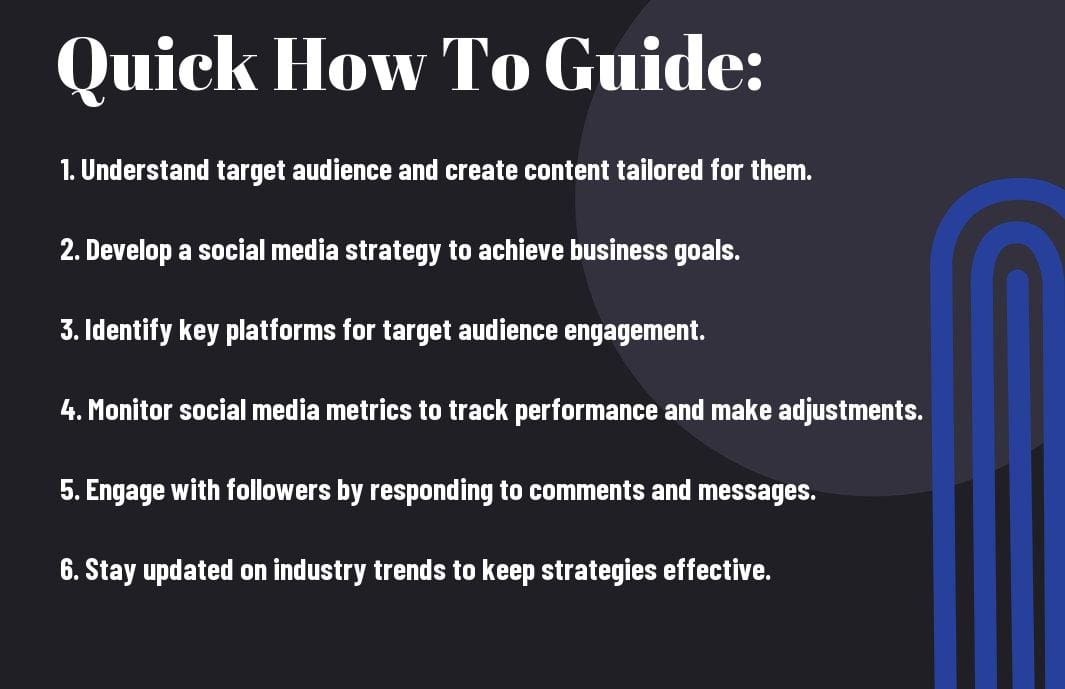Many aspiring social media marketing managers struggle with maintaining a strong online presence for their clients. In the fast-paced world of digital marketing, it is crucial to understand the art of managing online presence effectively. From creating engaging content to monitoring analytics, there are key strategies that can help you elevate your skills and become a successful social media marketing manager. In this guide, we will explore vital tips and best practices to help you master the art of managing online presence and drive impactful results for your clients.
Key Takeaways:
- Content is key: Creating high-quality and engaging content is crucial for a successful social media marketing strategy.
- Consistency is crucial: Maintaining a consistent online presence helps build brand recognition and keeps your audience engaged.
- Analytics are your friend: Regularly monitoring and analyzing your social media performance through analytics helps in making data-driven decisions to optimize your strategy.

Establishing A Solid Foundation
How-to Craft a Winning Social Media Strategy
Little can compare to the importance of crafting a winning social media strategy when it comes to establishing a solid foundation for your online presence. This strategy serves as the roadmap for your social media activities, outlining your goals, target audience, content themes, and posting schedule. By carefully crafting a strategy that aligns with your brand values and objectives, you set yourself up for success in the competitive world of social media marketing.
Tips for Aligning Your Social Media Goals with Business Objectives
Media planning While setting social media goals may seem straightforward, aligning them with your business objectives is crucial for driving meaningful results. To ensure that your social media efforts directly contribute to your overall business success, it’s imperative to align your goals with specific business objectives, such as increasing brand awareness, driving website traffic, or generating leads. Recognizing the interconnected nature of social media and business goals is key to maximizing the impact of your online presence.
- Set SMART goals that are Specific, Measurable, Achievable, Relevant, and Time-bound
- Regularly track and analyze your social media metrics to measure progress towards your business objectives
- Adjust your social media strategy as needed to ensure alignment with evolving business goals
Building and Maintaining Your Online Presence
How to Create Compelling Content That Engages
Not all content is created equal when it comes to building your online presence. To stand out in the crowded digital landscape, you need to create compelling content that resonates with your audience. Presence Establish a strong brand voice and tone, and tailor your content to suit the preferences of your target audience. Incorporate multimedia elements like images, videos, and infographics to make your content more engaging and shareable.
Factors Influencing Consistent Brand Messaging Across Platforms
Not maintaining consistent brand messaging across platforms can lead to confusion and dilution of your brand identity. To ensure a unified brand presence, you need to consider factors such as brand voice, visuals, and messaging. It’s important to have a clear brand style guide that outlines these elements and ensures that they are consistently applied across all platforms and channels. Thou Be mindful of the tone and language used in your messaging to maintain a cohesive brand image.
Engagement and Growth Strategies
How-to Effectively Engage with Your Audience
After setting up your social media accounts and creating engaging content, the next crucial step is to effectively engage with your audience. You can start by responding promptly to comments, messages, and mentions. Make sure to personalize your responses and show appreciation for feedback and interactions. Encourage conversations by asking questions and creating polls to gather insights and opinions from your followers. Building a community around your brand will foster loyalty and trust among your audience.
Tips for Implementing Growth Hacks and Measuring Success
You can implement growth hacks to boost your online presence and reach a wider audience. Utilize hashtags strategically to increase visibility and attract new followers. Collaborate with influencers or other brands to tap into new audiences and expand your reach. Track your performance using analytics tools to measure the success of your strategies and make data-driven decisions for future campaigns. Perceiving what works and what doesn’t will help you refine your approach and optimize results.
Audience
Engagement is key to building a strong online presence and growing your following. By actively interacting with your audience and fostering a sense of community, you can strengthen relationships with your followers and increase brand loyalty. Implementing growth hacks and monitoring success metrics will help you identify opportunities for improvement and optimize your social media strategy for maximum impact.

Advanced Management Techniques
Now, mastering advanced management techniques as a Social Media Marketing Manager is crucial for success in today’s digital landscape. Below are some key strategies to help you effectively manage your online presence:
- How-to Leverage Analytics for Strategic Decisions:
Analytics Strategic Decisions Utilize tools like Google Analytics Make data-driven decisions for campaigns Track engagement metrics Identify trends and opportunities How to Leverage Analytics for Strategic Decisions
An imperative aspect of managing social media accounts is leveraging analytics for making strategic decisions. By utilizing tools like Google Analytics and tracking engagement metrics, you can make data-driven decisions for your campaigns. This will help you identify trends and opportunities, ultimately leading to a more effective online presence.
- Factors to Consider When Managing Multiple Social Media Accounts:
- Consistency: Ensure brand messaging across all platforms
- Engagement: Interact with followers on all accounts
- Scheduling: Plan content ahead for each platform
Factors to Consider When Managing Multiple Social Media Accounts
While managing multiple social media accounts, it is crucial to consider factors like consistency in brand messaging, engagement with followers on all platforms, and scheduling content ahead for each platform. By ensuring these aspects are addressed, you can maintain a strong online presence across all channels.
Consider consistency in brand messaging, engagement with followers, and scheduling content as the most important factors to successfully manage multiple social media accounts. After addressing these key factors, Social Media Marketing Managers can effectively maintain a strong online presence and reach their target audience efficiently.
Dealing with Challenges
Tips for Handling Negative Feedback and Online Crisis
Unlike the positive engagement you strive for on social media, negative feedback and online crises are inevitable challenges that every social media marketing manager will face. When dealing with negative feedback, it is crucial to respond promptly and professionally. Address the issue publicly while offering to take the conversation offline to resolve it privately. During online crises, transparency and honesty are key. Keep your audience informed about the situation and the steps you are taking to rectify it. This will help to rebuild trust and strengthen your online reputation. This proactive approach can turn a crisis into an opportunity to showcase your brand’s integrity and customer commitment.
This proactive approach can turn a crisis into an opportunity to showcase your brand’s integrity and customer commitment. This is imperative to maintaining a positive online presence and demonstrating your ability to handle challenging situations effectively.
How-to Stay Up-to-Date with Social Media Trends and Algorithm Changes
If you want to excel as a social media marketing manager, it is crucial to stay updated with the ever-evolving landscape of social media trends and algorithm changes. Online platforms like Facebook, Instagram, Twitter, and LinkedIn frequently update their algorithms, impacting the visibility of your content. To stay ahead of the curve, make sure to follow industry leaders, attend relevant webinars, and subscribe to reputable sources for the latest updates. Monitoring analytics and engagement metrics will also help you understand what content resonates with your audience and adapt your strategies accordingly.
Conclusion
The role of a Social Media Marketing Manager is crucial in today’s digital landscape, and mastering the art of managing online presence is crucial for success in the field. By understanding the various platforms, engaging with the audience, and creating compelling content, a Social Media Marketing Manager can effectively build brand awareness and drive business growth. With the right strategies and skills in place, one can excel in this dynamic and ever-evolving field.
FAQ
Q: What is a Social Media Marketing Manager?
A: A Social Media Marketing Manager is responsible for developing and implementing marketing strategies to promote a company’s products or services on social media platforms. They create engaging content, analyze data to monitor the success of campaigns, and interact with the online community to build brand awareness and drive traffic to the company’s website.
Q: What skills are required to become a successful Social Media Marketing Manager?
A: To excel as a Social Media Marketing Manager, one needs a combination of creative, analytical, and communication skills. Proficiency in social media platforms, content creation, digital marketing, and data analysis are imperative. Strong organizational skills, the ability to multitask, and stay up-to-date with the latest trends in social media are also crucial.
Q: How can one master the art of managing online presence as a Social Media Marketing Manager?
A: To master the art of managing online presence, Social Media Marketing Managers should stay updated on industry trends, continuously experiment with different content types, and analyze data to understand what resonates with their audience. Building a strong online community, engaging with followers, and collaborating with influencers can also help in enhancing the brand’s online presence.




